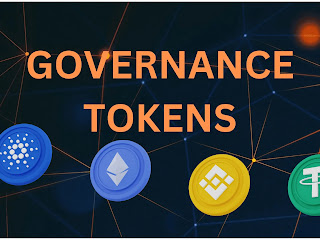Governance tokens play a crucial role in the world of decentralized systems, offering token holders the power to influence and participate in decision-making processes. These tokens are not just another form of cryptocurrency; they are the lifeblood of decentralized autonomous organizations (DAOs) and decentralized finance (DeFi) platforms, enabling stakeholders to govern protocols, propose changes, and vote on crucial matters. This article delves deep into the world of governance tokens, exploring their mechanics, significance, and future implications. Go bitcoin-bankbreaker.com/ and keep exploring investing and concepts related to it!
Understanding Governance Tokens
Governance tokens are unique digital assets that grant holders voting rights and decision-making powers within decentralized systems. Unlike traditional cryptocurrencies, which are primarily used for transactions, governance tokens represent ownership in a decentralized organization or platform. Holders can use these tokens to participate in governance proposals, vote on protocol changes, and even delegate their voting rights to others. Governance tokens are essential for achieving true decentralization. As they distribute power among a wide range of stakeholders, rather than centralizing it in the hands of a few.
The Mechanics of Governance
The mechanics of governance tokens vary depending on the platform or organization. However, most governance systems operate on a similar principle: token holders propose and vote on changes to the protocol. This process is often governed by smart contracts, which ensure that votes are transparent and immutable. Token holders can propose changes, such as modifying interest rates in a lending protocol or adding new features to a decentralized application (dApp). Once a proposal is submitted, token holders can vote on whether to implement it or not. The voting process is typically weighted by the number of tokens held by each voter. Giving more significant stakeholders more influence over the outcome.
Examples of Governance Tokens
Several prominent examples of governance tokens illustrate their importance and functionality. Compound (COMP), for instance, allows token holders to vote on changes to the Compound protocol, such as adding new assets or adjusting interest rates. Uniswap (UNI) token holders govern the Uniswap decentralized exchange, deciding on fees, pairs, and other protocol parameters. MakerDAO (MKR) holders govern the Dai stablecoin system, voting on issues like collateral types and stability fees. These examples highlight how governance tokens empower stakeholders to shape the future of decentralized systems.
Challenges and Risks
Despite their potential benefits, governance tokens also face several challenges and risks. One of the most significant challenges is voter apathy, as many token holders may not actively participate in governance processes. This can lead to decisions being made by a small, vocal minority, rather than the broader community. Additionally, there is a risk of centralization, as large token holders may have disproportionate influence over governance decisions, potentially leading to governance capture.
The Future of Governance Tokens
Despite these challenges, governance tokens have the potential to revolutionize traditional governance structures. As decentralized systems continue to evolve, governance tokens are likely to play an increasingly important role in shaping their development. Innovations such as quadratic voting and liquid democracy could further enhance the effectiveness of governance tokens, ensuring that decisions are made fairly and transparently. As the world becomes more decentralized, governance tokens will be at the forefront of this transformation. Empowering individuals to govern themselves and their communities in new and exciting ways.
Conclusion
Governance tokens are a powerful tool for achieving true decentralization, enabling stakeholders to govern protocols, propose changes, and vote on crucial matters. By distributing power among a wide range of stakeholders, governance tokens ensure that decisions are made transparently and fairly. As decentralized systems continue to evolve, governance tokens will play an increasingly important role in shaping their development. Whether through Compound, Uniswap, MakerDAO, or other platforms, governance tokens are paving the way for a more decentralized future.

